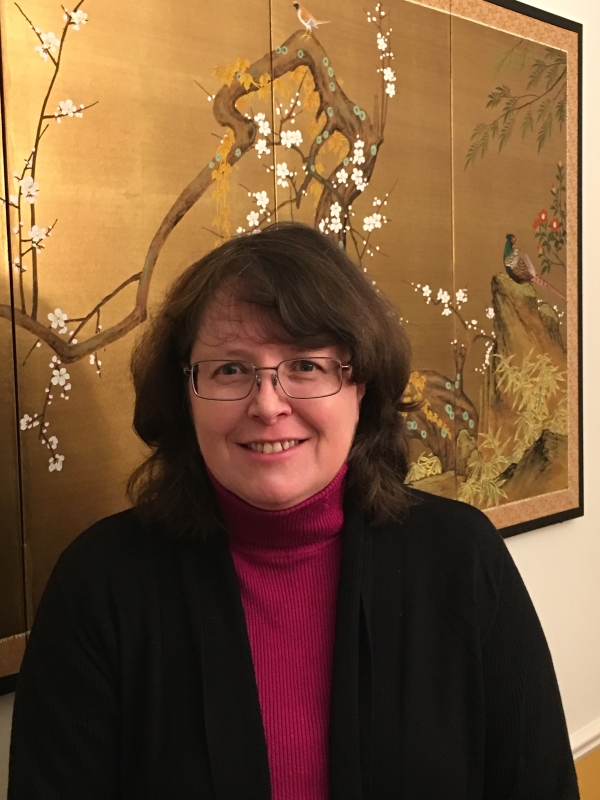| Faculty Profile |
|
Department
History
Phone
Fax
Office
3095 Faculty/Administration Building
Biography
Elizabeth Dorn Lublin grew up in Dayton, OH, and first traveled to Japan for a summer home stay through the American Field Service while in high school. She spent a semester abroad at Kansai University of Foreign Studies in Osaka during her junior year in college and, while in graduate school, attended a summer language program at Tokyo's International Christian University, completed the ten-month intensive course at the Inter-University Center for Japanese Language Studies in Yokohama, and was a research affiliate at Japan Women's University. Prior to starting graduate studies, she taught English in junior high schools in Tochigi for one year through the Japan Exchange and Teaching Program. Altogether, she spent roughly seven years in Japan before joining the faculty at Wayne State in 2001. The highlight of those years was an audience with the Emperor and Empress. This privilege came with Lublin's receipt of a Crown Prince Akihito Scholarship. While drinking barley tea and eating cherries with the imperial couple remain but a memory, she still has the two cigarettes embossed in gold with the chrysanthemum seal that she received during the visit.
Education
- Ph.D., Modern Japanese History, University of Hawaii at Manoa, 2003
- Certificate, Intensive Japanese Language Studies, Inter-University Center for Japanese Language Studies, Yokohama, Japan, 1997
- M.A., Japanese Studies, University of Michigan, 1994
- B.A., History and East Asian Studies, Yale University, 1991
Selected publications
"Nemoto Shō, Tobacco, and the Regulation of Youth in Meiji Japan." Studies on Asia 9, no. 1 (2024): 2-21. https://studiesonasia.scholasticahq.com.
"Sex Work during the Tokugawa Era.” In Oxford Research Encyclopedia of Asian History. Oxford University Press, September 15, 2022.
doi: https://doi.org/10.1093/acrefore/9780190277727.013.71.
"The Woman's Christian Temperance Union, Monogamy, and Defining 'Modern' for Women and Japan." In Christianity and the Modern Woman in East Asia, ed. Garrett L. Washington, 109-133. Leiden, Netherlands: Brill, 2018.
"Ichikawa Fusae (1893-1981)," "Senninbari and 'Comfort Bags,'" "Women during WWII: Kokubo Fujinkai and Aikoku Fujinkai," and "Yosano Akiko (1878-1942)." In Japan at War: An Encyclopedia, ed., Louis G Perez. Santa Barbara, CA: ABC-CLIO, 2013.
Reforming Japan: The Woman's Christian Temperance Union in the Meiji Period. Asian Religions and Society Series. Vancouver: University of British Columbia Press, 2010.
“Mary Clement Leavitt, Japan, and the Transnationalization of the World WCTU.” In Transnational Women’s Activism in Historical Perspective, ed. Erika K. Kuhlman and Kimberly Jensen, 13-36. History of International Relations, Diplomacy and Intelligence Series, vol. 14. Dordrecht, Netherlands: Republic of Letters Publishing, 2010.
“Wearing the White Ribbon of Reform and the Banner of Civic Duty: Yajima Kajiko and the Japan Woman’s Christian Temperance Union in the Meiji Period.” U.S.-Japan Women’s Journal, nos. 30-31 (2006): 60-79.
“Crusading against Prostitution: The Woman’s Christian Temperance Union in Meiji Japan.” Japanese Religions 29, nos. 1-2 (January 2004): 29-43.
“Selected Bibliography of Japanese-Language Sources on Drinking, the Woman’s Christian Temperance Union, and Reform Activism in Japan.” The Social History of Alcohol Review 16, nos. 1-4 (Fall 2001/Spring 2002): 335-343.
“Pollution Relief and the Japan Woman’s Christian Temperance Union.” Asian Cultural Studies 27 (2001): 49-58.
